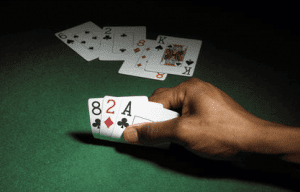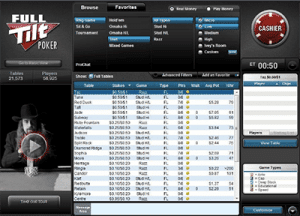How and where to play Seven-Card Stud
How and where to play Seven-Card Stud
Seven Card Stud was, until the increase in popularity of Texas Hold’em in recent years, the most popular form of home-game poker in the United States. Using a standard 52-card deck (no jokers), players are dealt a total of seven cards each (four visible up-cards and three private down-cards) over five rounds of betting. The aim of the game is to win the pot (the total hand’s prize pool) using a combination of good cards, skilful betting and guile. We explain more about how to play Seven Card Stud below.
The Deal

As the name of the game suggests, each player receives seven cards in a hand, provided they see out the game to the end of the five rounds. The four up-cards (or door cards) are visible to everyone at the table, and the three down-cards (or hole cards) are visible only to the player. The deal is structured as below, with cards dealt clockwise one at a time, and with each round of dealing followed by a round of betting:
- First Deal: two down-cards, then one up-card
- Second Deal: one up-card
- Third Deal: one up-card
- Fourth Deal: one up-card
- Fifth Deal: one down-card
The Bring
The hand usually starts with players playing an ante; a forced bet from all competitors that goes directly into the pot. Then, after the first deal (two down-cards, and one up-card deemed the third street, because it is the third card), we enter what is known as the bring or bring-in (this is the first round of betting).
Here, the player with the lowest-ranked door card (two being the weakest and Ace being the strongest) is required to wager either an amount equal to the ante, or equal to whatever the minimum bet is. If there are two or more players with an equally low-ranked up-card, poker suits are used as tie breakers: from weakest to strongest – Clubs, Diamonds, Hearts, Spades. For example, Player A has a Trey of Diamonds, Player B has a Trey of Hearts, Player C has a Seven of Clubs and Player D has an Ace of Spades; so Player A would pay the bring first.
Note: If the game is being played without the bring-in (which it can be), then betting starts with the player showing the highest-ranked door card. If this is the case, suits are not used to determine who starts in the event of two or more players holding the same card: the player who is first in a clockwise direction from the dealer will begin, and that player can opt to check, or bet at least the minimum, as opposed to being forced to bet. Play then continues in the same direction and players must match or raise based on the actions of the first player.

After the bring has been paid by the first player, the next player on the left continues proceedings by either folding (forfeiting his hand), calling (matching the amount of the bring), or raising (increasing the minimum bet).
If the bring was the same amount as the ante, a raise normally equals the minimum bet; if the bring was the same as the minimum bet, then a raise will double that amount. The round ends when all remaining players have matched the highest bet. Whether we play with or without the bring-in, a full first round of betting must be completed.
Fourth, Fifth & Sixth Street: Each of the next three rounds start with players who are still left in the game being dealt a single up-card. The person showing the best poker hand begins the betting action, and can choose to check or bet up to the game’s limit. In the event of a tied poker hand, most games use the suit rankings as tie breakers, exactly like the bring. Once the player with the strongest hand has made his play, the remaining players in turn can either check (if no bets have been made), call, raise or fold.
Seventh Street: After the first six cards have been dealt and all betting rounds completed, the remaining players receive their final hole/down card, and play begins with the same player who showed the best poker hand in the last round of betting (the Sixth Street). This is the final round of betting before a showdown (if necessary), where the remaining players reveal their hands.
The Showdown
If there is more than one player standing at the end of the betting rounds, then their hands enter a showdown to determine the winner. If there is just one player remaining, then they claim the pot uncontested without having to show their full hand. The victor is the one with the best five-card poker hand. All hands are limited to five cards, so if you’re holding three pairs, for instance, only the strongest two pairs will count. If there are two or more players with equal hands, then the winnings are split evenly between those players.
While a few versions of Seven-Card Stud use low hands (such as Seven-Card Hi-Lo), the vast majority of games focus only on the high hands, as listed below, from weakest to strongest:
- High Card – The single card of highest value in a hand.
- One Pair – Two cards of the same rank (Ex: 2, 2).
- Two Pair – Two different sets of pairs (Ex: 9, 9, 6, 6).
- Three of a Kind – Three cards of the same rank (Ex: 7, 7, 7).
- Straight – Five cards of consecutive rank (Ex: 4, 5, 6, 7, 8).
- Flush – Any five cards in the same suit (Ex: 2, 6, 8, J, A, all of Hearts).
- Full House – A three of a kind and a pair (Ex: 4, 4, 4, K, K – called ‘Fours full of Kings’).
- Four of a Kind – Four cards of the same rank (Ex: A, A, A, A).
- Straight Flush – Five cards of consecutive rank in the same suit (Ex: 10, J, Q, K, A, all of Spades – the ‘Royal Flush’).
Fixed Limit, Spread Limit & Pot Limit Stud

There are several sets of betting rules that can be used for Seven-Card Stud. The most common are limit variations, but what is the difference between them?
Fixed-Limit Stud: is the most popular platform for the game. In this format, the betting amounts are fixed as a small bet and a big bet. The small is the minimum bet in the early rounds, while the big – usually twice the size of the small bet – is used in the last three rounds. Antes are usually 10% of the small bet.
Note: In most Limit games, if a player is dealt a door-card on the Fourth Street which forms a pair with their other up-card, they actually have the option to play the big bet instead of the small bet, or to check. If the player opts to check, then the player to the left has the same three choices. If the big bet is played, that then becomes the minimum bet amount for the round.
Spread-Limit Stud employs a set minimum bet and a set maximum bet. Players are allowed to put up any amount between those limits, which often doubles for the last three betting rounds (ex: a $2.00 to $8.00 limit will become $4.00 to $16.00 from the Fifth Street onwards). This format is hugely flexible with numerous variations and house rules for antes, raising, etc.
Limit and Spread-Limit Stud often impose a cap on the number of times a player can raise during a betting round, with the standard being one bet and three raises per person.
Pot-Limit Stud: The maximum bet is determined by the size of the pot and bets on the table. For example, if there is $50 in the pot and a total of $10 in bets during the current round, the most a player can raise the bet by is $60. This is called ‘potting’ or ‘raising the pot.’ The minimum bring-in, in Pot-Limit Stud, is normally equal to the ante.
Not enough cards?
If there are eight players at a table and they all stay in the hand to Seventh Street, there will not be enough cards to deal each person their full quota of seven (do the maths – 52 cards/8 people = 6.5 cards per player). So, what is a dealer to do?
If this situation arises and the game has been played with burn cards (one card set aside and not used each round in order to make cheating impracticable), those cards can be used if only a few more cards are needed to finish the deal. If no burns were used, then a single card is dealt face-up on the table. This acts as a community card which all players use in place of a final down-card. Note: If you are playing at home, you may want to limit the game to seven players.
You can find Seven Card Stud at Full Tilt Poker which offers downloadable software for Mac or PC, but be aware that Full Tilt does not cater to players from all countries, depending on your local online gambling laws.
For the best online casinos offering RNG poker games, we recommend Stake.com as our top-rated casino site for players from United States, which has some excellent welcome bonuses available for new players along with a great range of poker variants, online slots and other table games.